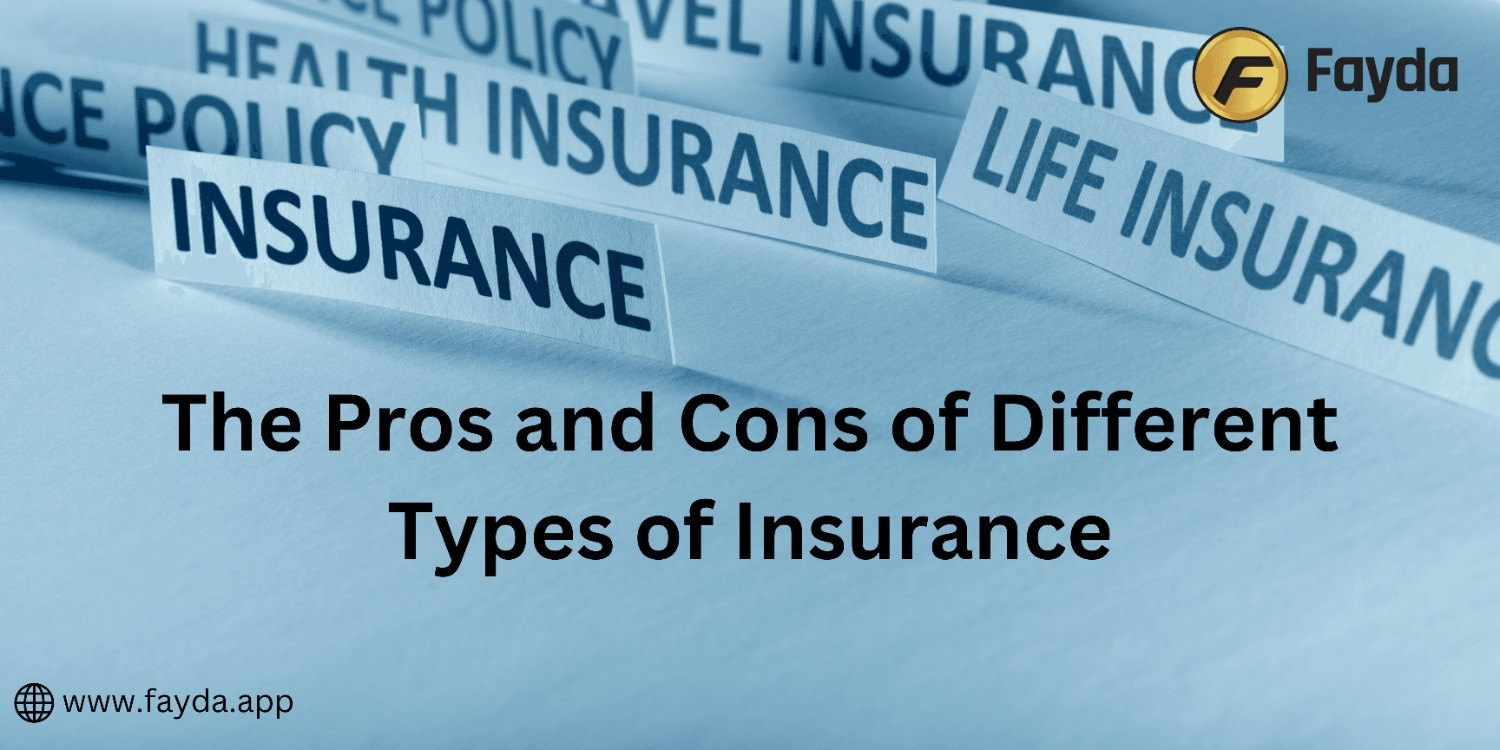Sep

The Pros and Cons of Different Types of Insurance
what is insurance?
Insurance is a contract between an individual or organization (the policyholder) and an insurance company. In exchange for a premium payment, the insurance company agrees to provide financial protection and compensation in the event of a specified loss or damage.
In simple terms, insurance is a way to protect yourself, your family, or your business from financial loss due to unforeseen events such as accidents, natural disasters, or illnesses. The insurance company assumes the risk of financial loss and provides the policyholder with a sense of security and peace of mind.
There are various types of insurance available, such as life insurance, health insurance, auto insurance, homeowners insurance, and disability insurance. Each type of insurance covers a specific type of risk and provides financial protection in case of unexpected events.
Insurance is regulated by state and federal laws to ensure that insurance companies operate fairly and provide adequate protection to policyholders. When purchasing insurance, it's important to carefully review the terms and conditions of the policy, understand the coverage and exclusions, and choose a reputable insurance company with a good track record of paying claims.
The Pros and Cons of Different Types of Insurance
Insurance is a way to protect yourself, your family, and your assets from financial loss due to unforeseen events. There are various types of insurance available, each with its own advantages and disadvantages. In this article, we will discuss the pros and cons of different types of insurance to help you make an informed decision.
Life Insurance
Life insurance is a type of insurance that provides a payout to your beneficiaries in the event of your death. There are two types of life insurance: term life insurance and permanent life insurance.
Life insurance is a type of insurance that provides financial protection for your loved ones in the event of your death. Essentially, it pays a lump sum of money to your beneficiaries upon your passing. This money can be used for a variety of things, such as paying off debts, covering living expenses, or funding education for your children.
There are two main types of life insurance: term life insurance and permanent life insurance. Term life insurance is designed to provide coverage for a specific period of time, such as 10, 20, or 30 years. If you die during the term of the policy, your beneficiaries receive a payout. If you do not die during the term of the policy, the coverage expires and you do not receive any money.
Permanent life insurance, on the other hand, is designed to provide coverage for your entire lifetime. It includes a death benefit as well as a cash value component that accumulates over time. You can borrow against the cash value of the policy or even surrender it for cash if you no longer need the coverage.
When purchasing life insurance, it's important to consider how much coverage you need, as well as the type of policy that best fits your needs and budget. A licensed insurance agent can help you navigate your options and find the right policy for you.
Pros:
Provides financial security to your beneficiaries in the event of your unexpected death.
Can be used to pay off debts, such as a mortgage or car loan.
Premiums for term life insurance are generally lower than permanent life insurance.
Cons:
Does not provide any benefits if you do not die during the policy term.
Premiums for permanent life insurance are generally higher than term life insurance.
May not be necessary if you have no dependents or debts to pay off.
Health Insurance
Health insurance is a type of insurance that covers medical expenses, including doctor visits, hospitalization, and prescription drugs.
Health insurance is a type of insurance that covers the cost of medical expenses, including doctor visits, hospitalization, prescription drugs, and other healthcare services. It provides financial protection to individuals and families by paying for the costs of healthcare services that may be needed due to illness, injury, or chronic conditions.
Health insurance can be obtained through an employer-sponsored plan, individual plan purchased through a private insurance company, or government-sponsored plans such as Medicare or Medicaid. The cost of health insurance premiums can vary depending on the type of plan, coverage level, deductibles, and co-payments.
Health insurance plans can vary in their coverage, including the types of services covered, the amount of coverage, and the out-of-pocket expenses required. Some health insurance plans provide comprehensive coverage that includes preventive care, wellness visits, and chronic disease management, while others may offer limited coverage with high out-of-pocket costs.
Having health insurance is important because it can help individuals and families manage healthcare costs and avoid the financial burden of unexpected medical expenses. Without health insurance, individuals may be responsible for paying the full cost of medical care out-of-pocket, which can be costly and financially devastating.
In summary, health insurance is a type of insurance that provides financial protection for medical expenses. It can help individuals and families manage healthcare costs and avoid the financial burden of unexpected medical expenses.
Pros:
Provides financial protection from high medical bills.
Can include preventative care, such as annual check-ups and vaccinations.
May offer additional benefits, such as dental and vision coverage.
Cons:
Premiums can be expensive, especially for comprehensive coverage.
May have high deductibles and co-payments.
May not cover certain medical procedures or treatments.
Auto Insurance
Auto insurance is a type of insurance that covers damages and injuries resulting from car accidents.
Auto insurance is a type of insurance that provides financial protection and coverage for damages and injuries resulting from car accidents. Auto insurance is required by law in most states in the United States and is designed to protect drivers from financial loss due to unexpected events.
Auto insurance policies typically include several types of coverage, including:
Liability Coverage: This type of coverage is required by law and covers damages and injuries that you are responsible for in a car accident. It includes two types of coverage - Bodily Injury Liability, which pays for the medical expenses, lost wages, and other damages for the other party involved in the accident, and Property Damage Liability, which covers the damage to the other party's vehicle or property.
Collision Coverage: This coverage pays for the damages to your own vehicle in the event of a collision with another vehicle or object, regardless of who is at fault.
Comprehensive Coverage: This coverage pays for damages to your vehicle caused by non-collision events such as theft, fire, or natural disasters.
Uninsured/Underinsured Motorist Coverage: This coverage pays for damages and injuries that you incur in a car accident caused by a driver who is uninsured or underinsured.
Auto insurance premiums are based on various factors such as age, driving record, location, type of vehicle, and coverage options selected. It's important to shop around and compare rates from different insurance companies to find the best coverage and rates for your specific needs.
Having auto insurance is not only required by law but also provides financial protection and peace of mind in the event of a car accident.
Pros:
Protects you from financial loss due to damages or injuries caused by car accidents.
Can include additional benefits, such as roadside assistance and rental car coverage.
May be required by law in your state.
Cons:
Premiums can be expensive, especially if you have a poor driving record.
May have high deductibles and limits on coverage.
May not cover certain types of damages or injuries, such as those caused by natural disasters.
Homeowners Insurance
Homeowners insurance is a type of insurance that covers damages and losses to your home and personal property.
Homeowners insurance, also known as home insurance or property insurance, is a type of insurance policy that provides financial protection to homeowners against damages or losses to their home and personal belongings. It typically covers a wide range of risks, including fire, theft, vandalism, natural disasters, and liability for injuries or damages that may occur on the property. Homeowners insurance helps homeowners rebuild, repair, or replace their home and possessions in case of covered events, and may also provide liability coverage for legal expenses if someone is injured on the property. It is typically required by mortgage lenders as a condition of obtaining a home loan and is an important way to protect one's investment in their home.
Pros:
Protects you from financial loss due to damages or losses to your home and personal property.
May include liability coverage in case someone is injured on your property.
May be required by your mortgage lender.
Cons:
Premiums can be expensive, especially for comprehensive coverage.
May have high deductibles and limits on coverage.
May not cover certain types of damages or losses, such as those caused by natural disasters or flooding.
Disability Insurance
Disability insurance is a type of insurance that provides income replacement in the event that you become disabled and are unable to work.
Disability insurance, also known as disability income insurance or disability income protection, is a type of insurance that provides financial protection to individuals in the event that they are unable to work due to a disability or illness. It is designed to replace a portion of the individual's lost income, usually a percentage of their pre-disability earnings, during the period of disability. Disability insurance helps to protect against the financial impact of lost wages, medical expenses, and other living expenses that may arise when an individual is unable to work due to a disability. It can be obtained through private insurance providers or as part of an employer-sponsored benefits package.
Pros:
Provides financial security in case you become disabled and are unable to work.
Can help cover your living expenses and other financial obligations.
May be offered through your employer or purchased individually.
Cons:
Premiums can be expensive, especially for comprehensive coverage.
May have a waiting period before benefits are paid out.
May have exclusions or limitations on coverage.
In conclusion, each type of insurance has its own pros and cons. It's important to carefully consider your personal and financial situation when choosing the type and amount of insurance coverage you need. By doing so, you can protect yourself and your family from financial loss and achieve peace of mind.


